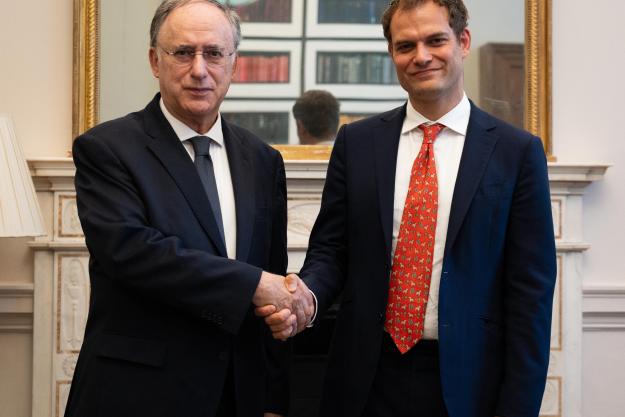The United Kingdom of Great Britain and Northern Ireland has made a voluntary contribution of £650,000 to the Organisation for the Prohibition of Chemical Weapons (OPCW) to support activities in relation to Syria and Ukraine, boosting laboratory capabilities in under-represented regions, and advancing innovative Artificial Intelligence (AI) projects.
The voluntary contribution was formalised on 4 September 2024 in a signing ceremony held between the United Kingdom's Parliamentary Under-Secretary of State, Hamish Falconer MP, and the OPCW Director-General, Ambassador Fernando Arias, at the Foreign, Commonwealth and Development Office in London.
The voluntary contributions will support three key OPCW fields of activity:
£200,000 are directed to support assistance and protection against chemical weapons. The United Kingdom's contribution is specifically earmarked for assistance and protection activities related to Ukraine.
£200,000 are provided to support the work of the OPCW in Syria including the Declaration Assessment Team (DAT), the Fact-Finding Mission (FFM), and the Investigation and Identification Team (IIT).
Finally, a voluntary contribution of £250,000 is earmarked for initiatives aimed at enhancing the geographic diversity of laboratories seeking OPCW Designation, as well as two key AI-related projects:
- A contribution of £125,000 supports assessing and enhancing the capacity of analytical laboratories in African and GRULAC (Group of Latin American and Caribbean) OPCW Member States working towards achieving OPCW Designated laboratory status. OPCW Designated Laboratories have advanced analytical capabilities and are held to stringent testing standards, ensuring reliable results and are an integral element of the global chemical weapons non-proliferation regime. These funds aim to increase the regional diversity of OPCW Designated laboratories.
- A contribution of £75,000 supports the OPCW AI Research Challenge project, which seeks to identify tangible ways in which AI can improve the efficiency and effectiveness of the OPCW's work.
- A contribution of £50,000 supports the OPCW's Global Conference on AI in Advancing Implementation of the Chemical Weapons Convention. The Conference, to be held in October 2024 in Morocco, will deepen understanding of AI's role in chemical security, inform policy, and strengthen international collaboration, ultimately helping the OPCW address emerging threats and improve its verification and inspection capabilities.

Ambassador Fernando Arias, OPCW Director General, meets with Mr Hamish Falconer MP, Parliamentary Under-Secretary of State
Photo: UK Foreign, Commonwealth and Development Office
Minister Falconer said: "I was delighted to mark the UK's voluntary contributions to OPCW projects this year with Director General Arias, during his visit to the UK. Our funding will support important projects, including Assistance to Ukraine, the Syria Missions, and the AI global conference. We are both determined to uphold the global norm against chemical weapons, and the OPCW has the UK's full support."
Director-General Arias stated: "The OPCW welcomes the United Kingdom's voluntary contributions that advance the goals of the Chemical Weapons Convention. These funds will reinforce our ongoing work in relation to Syria and Ukraine and strengthen our work in emerging fields such as artificial intelligence, helping us respond to both current and future challenges. This exemplifies the kind of collaborative effort needed to safeguard the world from chemical weapons and ensure that we remain at the forefront of global disarmament efforts."
The Director-General encouraged all OPCW Member States to consider supporting the Organisation's priority activities, through voluntary and in-kind contributions.
Background
The United Kingdom of Great Britain and Northern Ireland has been an active member of the OPCW since the Chemical Weapons Convention entered into force in 1997. The United Kingdom is a member of the OPCW Executive Council, the OPCW's executive organ, which is responsible for promoting the effective implementation of and compliance with the Chemical Weapons Convention as well as supervising the activities of the Organisation's Technical Secretariat.
As the implementing body for the Chemical Weapons Convention, the OPCW, with its 193 Member States, oversees the global endeavour to permanently eliminate chemical weapons. Since the Convention's entry into force in 1997, it is the most successful disarmament treaty eliminating an entire class of weapons of mass destruction.
In 2023, the OPCW verified that all chemical weapons stockpiles declared by the 193 States Parties to the Chemical Weapons Convention since 1997 - totalling 72,304 metric tonnes of chemical agents - have been irreversibly destroyed under the OPCW's strict verification regime.
For its extensive efforts in eliminating chemical weapons, the OPCW received the 2013 Nobel Peace Prize.






